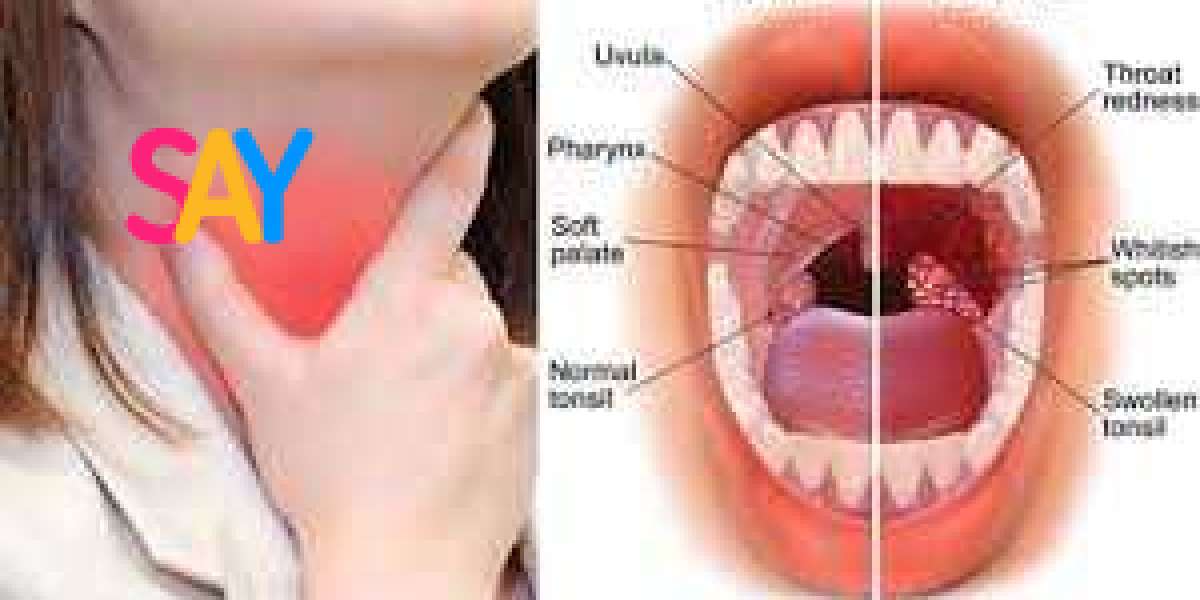Tonsillitis is a common condition that occurs when the tonsils, the two small glands located at the back of the throat, become inflamed due to infection. It can affect people of all ages but is most common in children and teenagers. Recognizing the symptoms of tonsillitis is crucial for timely diagnosis and treatment. In this article, we’ll explore the symptoms, causes, and treatment options for tonsillitis, as well as tips for managing the condition.
What Are Tonsils and Why Do They Get Inflamed?
The tonsils are part of the body’s immune system and act as the first line of defense against bacteria and viruses entering through the mouth and nose. However, they can become infected themselves, leading to inflammation and swelling, a condition known as tonsillitis. Tonsillitis can be caused by both viral and bacterial infections, with streptococcal bacteria being a common culprit.
Common Symptoms of Tonsillitis
The symptoms of tonsillitis can vary depending on the cause and severity of the infection. Here are the most common signs to watch out for:
1. Sore Throat
A sore throat is one of the most noticeable symptoms of tonsillitis. It may start as mild discomfort but can become severe, making it difficult to swallow food or liquids.
2. Swollen Tonsils
Inflamed tonsils often appear red and swollen. In some cases, they may have white or yellow patches or a coating, indicating the presence of pus.
3. Difficulty Swallowing
Swelling and pain in the throat can make swallowing painful and challenging. This can lead to reduced appetite and dehydration if not managed properly.
4. Fever and Chills
A high fever, often accompanied by chills, is a common symptom of tonsillitis, especially if the infection is bacterial.
5. Bad Breath
The presence of bacteria or pus in the tonsils can cause bad breath (halitosis), which is often noticeable even with good oral hygiene.
6. Ear Pain
The nerves in the throat and ears are closely connected, so tonsillitis can sometimes cause referred pain in the ears.
7. Headache
Many people with tonsillitis experience headaches, which can range from mild to severe.
8. Fatigue and Malaise
Feeling tired and generally unwell is common with tonsillitis, as the body works to fight off the infection.
9. Swollen Lymph Nodes
The lymph nodes in the neck may become swollen and tender to the touch as they respond to the infection.
10. Voice Changes
In some cases, tonsillitis can cause hoarseness or changes in the voice due to throat inflammation.
Causes of Tonsillitis
Tonsillitis is primarily caused by viral or bacterial infections. Common causes include:
Viral Infections: Viruses such as the common cold, flu, or Epstein-Barr virus (which causes mononucleosis) are frequent causes of tonsillitis.
Bacterial Infections: Streptococcus pyogenes, the bacteria responsible for strep throat, is a common bacterial cause of tonsillitis.
Other Factors: Allergies, irritants like smoke, and chronic sinus infections can also contribute to tonsillitis.
When to See a Doctor
While mild cases of tonsillitis can often be managed at home, it’s important to seek medical attention if you experience:
A sore throat that lasts more than 48 hours.
Difficulty breathing or swallowing.
A high fever (above 101°F or 38.3°C).
Severe pain or swelling in the throat.
Recurrent episodes of tonsillitis.
A doctor can perform a physical examination and may recommend a throat swab or blood test to determine the cause of the infection.
Treatment Options for Tonsillitis
The treatment for tonsillitis depends on whether the infection is viral or bacterial. Here are some common approaches:
1. Home Remedies
For mild cases of viral tonsillitis, home remedies can help alleviate symptoms:
Gargle with warm salt water to reduce throat pain and inflammation.
Stay hydrated by drinking plenty of fluids.
Use a humidifier to keep the air moist and soothe the throat.
Rest to allow your body to recover.
2. Over-the-Counter Medications
Pain relievers like ibuprofen or acetaminophen can help reduce fever and relieve throat pain. Throat lozenges and sprays may also provide temporary relief.
3. Antibiotics
If the tonsillitis is caused by a bacterial infection, your doctor may prescribe antibiotics like Almox 500 (amoxicillin). It’s important to complete the full course of antibiotics to ensure the infection is fully treated and to prevent complications.
4. Surgery (Tonsillectomy)
In cases of recurrent or chronic tonsillitis, a doctor may recommend a tonsillectomy, which is the surgical removal of the tonsils. This is typically considered a last resort when other treatments have failed.
Preventing Tonsillitis
While it’s not always possible to prevent tonsillitis, you can reduce your risk by:
Practicing good hygiene, such as washing your hands regularly.
Avoiding close contact with people who are sick.
Not sharing utensils, drinks, or personal items.
Strengthening your immune system through a healthy diet, regular exercise, and adequate sleep.
Conclusion
Tonsillitis is a common but uncomfortable condition that can significantly impact your daily life. Recognizing the symptoms early and seeking appropriate treatment can help you recover faster and prevent complications. Whether it’s through home remedies, over-the-counter medications, or prescribed antibiotics like Almox 500, there are effective ways to manage tonsillitis and restore your health.




